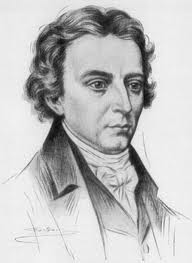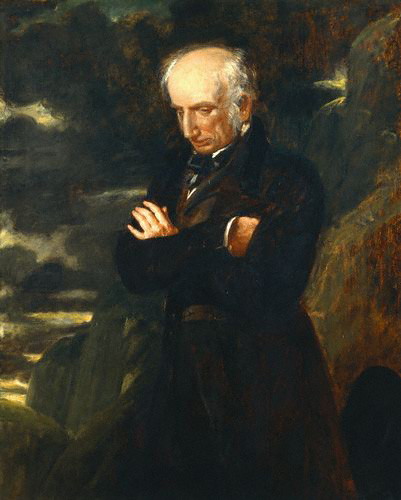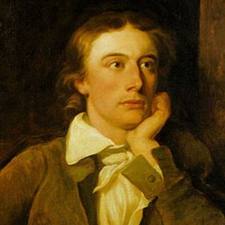
英国名诗120首 - 6(英汉对照)
陈水明(1962届)译

Robert Southey (August 12, 1774, March 21, 1843)
was an English poet of the Romantic school,
one of the so-called "Lake Poets", and Poet Laureate for 30 years
from 1813 to his death in 1843
47. After Blenheim
by Robert Sohthey
It was a summer evenin,
Old Kaspar’s work was done.
And he before his cottage door
Was sitting in the sun;
And by him sported on the green
His little grandchild Wilhelmine.
She saw her brother Peterkin
Roll something large and round
Which he beside the rivulet
In playing there he had found;
He came to ask what he had found
That was so large and round.
Old kaspar took from the boy
Who stood expectant by;
And then the old man shook his head,
And with a nature sigh
“‘Tis some poor fellow’s skull,” said he,
“Who fell in the great victory.
“I find them in the garden,
For there’s many here about;
And often when I go to plough
The ploughshare turns them out.
For many thousand men,” said he,
“Were slain in that great victory.”
“Now tell us what ‘twas all about”
Young Peterkin he cries;
And little Wilhelmine looks yu
With wonder waiting eyes;
“Now tell us all about the war,
and what they fought each other for.”
“It was the English,” Kaspar cried,
“Who put the french to rout;
But what they fought each other for
I could not well make out.
But everybody said,” quoth he,
“That ‘twas a famous victory.
“My father lived at Blenheim then,
Yon little stream hard by;
They burnt his dwelling to the ground,
And he was forced to fly;
So with his wife and child he fled,
Nor had he where to rest his head.
“With fire and sword the country round
Was wasted far and wide,
And many a childing mother then
And new-born baby died;
But things like that, you know, must be
At every famous victory.
“They say it was a shodking sight
After the field was won;
For many thousand bodies here
Lay rotting in the sun;
But things like that, you know, must be
After a famous victory
“Great praise the Duke of Marlbro’ won
And our good Prince Eugence;”
“Why, ‘twas a wicked thing!”
Said little Wilhelmine.
“Nay..nay..my little girl,”quoth he,
“It was a famous victory.
“And everybody praised the Duke
Who this great fight did win.”
“But what good came of it at last?”
Quoth little Peterkin:
“Why, that I cannot tell,” said he,
“But ‘twas a famous victory.”
47. 布连海姆战役后-将成名万骨枯
罗伯特•骚赛
时值夏日夕阳西下,
老卡斯波忙碌完后
坐于茅屋前享晚霞
彼之幼女孙薇勒玛
于其身旁草地戏耍。
伊见伊兄佩特金
滚动一物园且大。
该物系彼于溪旁,
游戏中发现捡下。
老人前来相问,
何物如斯大而圆滑
手执该物审查,
孙辈立旁凝视惊讶。
老人摇首复长叹,
“噫兮,此系可怜河边骨,
生前于伟大战役中被杀!
此物于此无需惊讶。
予于菜园中曾见过
于田中耕地犁耙
亦常翻出于地下。
曾有千千万万战士
于布连海姆伟大胜利中
命断天涯。”
小佩特向前问“
爷爷,究为啥?”
薇勒玛仰起头,瞪双眼
满脸惊讶;
“请告我辈儿童
彼等为何打与杀?”
“于彼战役中,
英人大胜,法人鼠窜、弃盔丢甲。
究竟为何打。
予亦弗知。
人云亦云,
系著名之战,伟大!伟大!
“予父斯时居于布连海湾,
距此小溪不远地方;
军人烧毁彼家房
逼彼流亡奔他乡,
难寻安身处
携妻负子、四处飘荡。
“火与剑毁灭一切,
到处一片凄凉。
无数母亲怀抱婴儿
于战火中悲惨死亡。
但尔等须知,此等景象
于所有名战役后俱平常。
据传我军大胜,
但战后景象令人神伤
腐烂臭味令人呕。
弃尸遍野曝于骄阳。
但尔等须知,此等景象,
于所有名战役后俱平常。
“为此伟大胜利
玛尔波罗公爵倍受颂;
尤金亲王亦赢来奖赏。”
小薇勒玛插问:
“此战何等残酷令人伤!”
“但,但。。。予之小女孙,
彼乃一著名战役四海扬!
“人人将玛尔波罗颂扬,
因其赢得伟大胜利于战场。”
小佩特金插问:
“该战究于人何利可尝?”
---“ 予亦难言,但,但,”
老人喃喃自语:
“彼乃一著名战役四海扬。”
*罗伯特 骚赛(1774-1843)英国湖畔诗人,曾获桂冠诗人称号。
布连海战役发生于1704年8月13日。读此诗时不禁令人想起“可怜无定河边骨,犹是春闺梦里人”之句。

William Wordsworth (7 April 1770 – 23 April 1850) was a major English Romantic poet who, with Samuel Taylor Coleridge, helped to launch the Romantic Age in English literature with the 1798 joint publication Lyrical Ballads. Wordsworth was Britain's Poet Laureate from 1843 until his death in 1850.
48. I Travell’d Among Unknown Men
William Wordsworth
I travell’d among unknown men,
In lands beyond the sea;
Nor, England! Did I know till then
What love I bore to thee.
‘Tis past, that melancholy dream!
Nor will I quit thy shore
A second time; for all still I seem
To love thee more and more.
Among thy mountains did I feel
The joy of my desire;
And she I cherish’d turn’d her wheel
Beside an English fire.
Thy mornings show’d, thy nights conceal’d!
The bowers where Lucy play’d;
And thine too is the best green field
That Lucy’s eyes survey’d.
48. 予于陌生人中旅行
威. 华兹华斯
予于陌生人中旅行,
独在海外飘零。
噫嘻,英格兰,
今日方觉予与子之情。
忆往者,忧郁梦境。
予否愿离尔复远行,
随时光之流逝
予爱尔与日俱增。
梦与尔山中漫行,
心神旷怡,无限欢腾。
聆予衷情之少女,
英式炉旁传来纺车声。
朝阳照射,夜晚遮蔽,
露茜曾嬉戏之闺中。
彼亦系最后之绿地,
抚慰露茜之明媚双睛。
*威廉姆•华兹华斯 (1770-1850) 英国湖畔诗派首领。
49. Lucy
William Wordsworth
She dwelt among the untrodden ways
Beside the spring of Dover;
A maid whom there were none to praise
And very few to love.
A violet by a mossy stone
Half-hidden from the eye!
--Fair as a star, when only one
Is shining in the sky,
She lived unknown, and few could know
When Lucy ceased to be;
But she is in her grave, and, oh,
The difference to me!
49.露茜
威廉姆•华兹华斯
伊居于白鸽泉边
周围荒芜少人烟。
亭亭少女无人赞。
亦曾少为人爱怜。
苔石之旁紫罗兰
半遮红颜不易见。
美如天上一亮星
发光闪闪射人间。
伊无名亦鲜人知
何时悄悄离人间
愿伊墓里长安息
噫,可怜!
于我乃地异天变
50.The Solitary Reaper
by William Wordworth
Behold her, single in the field,
Yon solitary Highland lass!
Reaping and singing by herself;
Stop here, or gently pass!
Alone she cuts and binds the grain,
And sings a melancholy strain;
O, listen! For the vale profound
Is overflowing with the sound.
No nightingale did ever chaunt
More welcome note so weary bands
Of travelers in some shady haunt,
Among Arabian sands:
No sweeter voice was ever heard
In spring-time from the cuckoo-bird,
Breaking the science of the seas
Among the farthest Hebrides.
Will no one tell me what she sings?
Perhaps the plaintive numbers flow
For old, unhappy, far-off things,
And battles long ago:
Familiar matter of today?
Some natural sorrow, loss or pain,
That has been, and may be again!
Whate’er he theme, the maiden sang
As if her song could have no ending,
I saw her singing at her work,
And o’er the sickle bending;
I listen’d, motionless and still;
And, as I mounted up the hill,
The music in my heart I Bore
Long after it was heard no more.
50. 孤独的割麦女
威廉姆•华兹华斯
请遥望,远处高地,
彼女孤零于田间。
独自割麦独低唱,
时停时而轻步姗姗。
歌调一何惨。
细听,于此深深山谷,
尽伊歌声弥漫。
于阿拉伯沙里荫地
无夜莺歌如此缠绵
迎来多少旅人
乐尔忘去疲倦
于远处希伯德群岛
春日之杜鹃
啼破沉静海洋
亦无声如斯婉转。
无人告予伊何所唱
系昔年之悲伤,
遥远之不幸,
抑悲惨之战场?
系民谣
抑伊习以为常?
系天灾,痛苦,死亡,
从前有,今后亦同样?
姑无论伊何所唱
歌声似无尽长
予见其伏身持镰
且割且唱。
予凝神屏息听
直至登上山岗。
歌声已不闻
却仍萦心上。
51. The Rainbow
W. Worsworth
My heart leaps up when I behold
A rainbow in the sky;
So was it when my life began,
So is it now I am a man,
So be it when I shall get old
Or let me die!
The child is father of the man:
And I could wish my days to be
Bound each to each by natural piety.
51 .虹
威廉姆•华兹华斯
仰视天上虹,难抑心头动。
幼时如斯;成年如斯;
老亦如斯,否则令我眠佳城。
幼儿乃大人之父:
愿予之一生,
永保人之本性。

John Keats was an English Romantic poet.
He was one of the main figures of the second generation
of romantic poets along with Lord Byron and
Percy Bysshe Shelley, despite his work only
having been in publication for four years before his death.
52. La Bells Dame Sans Merci
by John Keats
“O what can all thee, knight-at-arms,
Alone and palely loitering?
The sedge is wither’d from the lake,
And no birds sing.
O what can all thee, knight-at-arms,
So haggard and so woe-begone?
The squirrel’s granary is full,
And the harvest’s done..
I see a lily on thy brow
With anguish moist and fever dew;
And on thy cheek a fading rose
Fast withereth too.”
“I met a lady in the meads,
Full beautiful—a faery’s child,
Her hair was long, her foot was light
And her eyes were wild.
I made a garland for her head,
And bracelets too, and fragrant zone;
She look’d at me as she did love,
And made sweet moan.
I set her on my pacing steed
And nothing else saw all day long,
For sideways would she lean, and sing
A faery’s song.
She found me roots of relish sweet,
And honey wild and manna dew,
And sure in language strange she said,
‘I love thee true!’
She took me to her elfin grot,
And there I dream’d ---Ah! Woe betide!
The latest dream I ever dream’d
On the cold hill’s side.
I saw pale kings and princes too,
Pale worries, death pale were they all;
Who cried ----‘La belle Dame sans Merci
Hath thee in thrall!’
I saw their starved lips in the gloam
With horrid warning gaped wide,
And I awoke and found me here
On the cold hill’s side.
And this is why I sojourn here
Alone and palely loitering,
Though the sedge is wither’d from the lake,
And no birds sing.”
52.无情妖女
约翰•济慈
“何为者,尔勇敢骑士,
面色苍白,徘徊忧郁
湖中菖蒲已枯萎。
池鸟亦不鸣倦息。
何为者,尔勇敢骑士,
如斯忧伤,如斯倦疲
松鼠粮已储满仓
田禾已收割完毕?
予见尔眉
似百合带病露与愁雨
尔之双颊
似即将调零之红玫瑰。”
“于草地予遇妙龄女郎,
天生丽质美无双。
长发垂肩,步履轻盈
双眸闪出豪放光。
予为伊制花冠与手镯,
又将一香带系伊腰上
伊向予柔声呻吟
以双目诉说衷肠
予将伊置予马上
整日只与伊相向
伊亦常向予转身
将仙歌对予歌唱
伊予吾甘美根菜
野蜜甘露甜又香
以异乡语对予讲,
“吾爱尔,情郎。”
伊携予入其仙房。
哀叹复将悲声放
予四次将伊亲吻
闭其双眼何热狂。
伊骗予渐渐入眠
噫,梦里祸从天降!
此系最后一梦。
于寒冷之山岗。
周围有武士王子国王,
个个面无人色与仓皇。
彼等群呼
“系无情妖女将尔伤!”
予幽暗中见彼饥饿双唇
向予发出警告之音。
醒来时发现,
予已身卧寒冷山阴
因此予面色苍白,
徘徊忧郁,
纵湖中菖蒲已枯萎
池鸟亦不鸣倦息。
*约翰 济慈(1735-1821)英国著名抒情诗人。
53. When I Have Fears
by John Keats
When I have fears that I may cease to be
Before my pen has glen’d my teeming brain,
Before high-piled books, in charactery,
Hold like rich garners the full ripen’d grain.
When I behold, upon the night’s starr’d face.
Huge cloudy symbols of a high romance
And think that I may never live to trace
Their shadows, with the magic hand of chance;
And when I feel, fair creature of an hour,
That I shall never look upon thee more,
Never have relish in the faery power
Of unreflecting love,----then on the shore
Of the wide world I stand alone, and think
Till love and fame to nothingness do sink.
53.当我忧虑时
约翰•济慈
当未集思以笔写于书间,
犹如成熟稻谷未入库前,
予忧虑予之生命即将完。
每当仰视闪烁星空
望见巨大模糊浪漫,
忧虑予否能存至该天
以奇手将其幻像描全。
当想到淑女如尔,永难再见,
予即弗能陶醉于爱情仙境---
斯时予将孤立沉思于
茫茫世界之岸
直至爱情与声名俱成虚幻。
54.Mermaid Tavern
John Keats
Soul of poets dead and gone,
What Elysium ye known.
Happy field or mossy cavern,
Choicer than the Mermaid Tavern?
Have ye tipped drik more fine
Than mine host’s Canary wine?
Or are fruits of Paradise
Sweeter than those dainty pies
Of vension? O generous food?
Drest as though bold Rpbin Hood
Would, with his maid Marian,
Sup and bowse from horn and can.
I have heard on a day
Mine host’s sign-board flew away,
Nobody knew whiter, till
An astroger’s old quill
To a sheepkin gave the story,
Said he saw you in your glory
Underneath a new old sign
Sipping beverage divine,
And pledging with contented smack
The Mermaid in the Zodiac.
Souls of Poets dead and gone,
What Elysium have ye known,
Happy field or mossy cavern,
Choicer thanthe Mermaid Tavern?
54. 美人鱼酒店
约翰•济慈
请问已逝诗人之灵,
是否曾见仙境,
幽洞或幸福田园,
超越美人鱼酒店?
可曾品尝如斯佳酿
较此酒店之更芬芳?
抑或食果品佳肴于天堂
较此酒店鹿肉馅饼更香?
噫!此种美味人间少有,
勇敢之罗宾汉亦到此尝,
彼携其女伴玛丽安,
角杯碗盛酒食尽情欣赏。
但予曾闻某一天,
酒店幌子飞走不见,
无人知其落何方,
直至一位星相家
用鹅毛笔羊皮纸
将谜底揭穿。
彼云尔等予该招牌下,
神采奕奕饮仙酒取欢,
边饮边称赞
黄道宫中美人鱼酒店。
请问已逝诗人之灵
是否曾见仙境,幽洞
或幸福田园,
超越美人鱼酒店。 |






![]()
![]()
![]()
![]()
